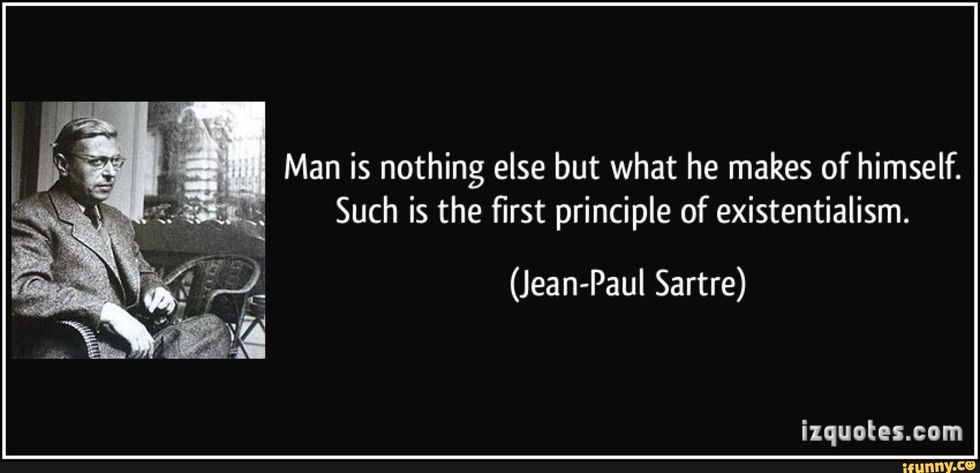In the essay “Existentialism is a Humanism” Sartre, a French writer whose philosophy resolved around the concepts of existentialism, attempts to better clarify the ideology supported by the existential school of thought through the critical analysis of arguments posed by opposing critics. In the piece Sartre highlights existentialism’s defining traits, arguing that it is essentially a philosophy of positivity, thus, refuting antagonistic accusations denoting the existentialist philosophy as one that focuses only on the “dark side of human life.”
As he presents it, existentialism preaches for the existence of individual agency and exposes the sense of moral responsibility that is invested in the individual. Sartre argues that guidance provided by an omnipotent being is nonexistent therefore placing all responsibility for one’s actions upon the individual. Knowing that God does not exist, as Sartre explains, also places humans in a state of perpetual abandonment thus eliciting in us feelings of desperation once faced with the realization that life carries no other meaning beside that which we ascribe to it. Although, I generally do agree with Sartre that the philosophy of existentialism carries elements of positivity, I fail to support the existentialists’ neglect of the massive role played by nature and nurturing in constructing the individual’s understanding of the “self”.
As I understand it, Sartre’s existentialist concepts suggest that the individual is capable- or better yet is responsible- for creating their own self-definition. One is not born knowing who they are or who they will become, instead one molds their own character through the free choices one makes throughout the course of one’s life. Sartre summarizes this understanding by simply stating that “existence precedes essence”, thus emphasizing his belief that life has no meaning a priori. Yes, ideally this may appear to be a spectacular concept as it arms individuals with the weapon of free choice, enabling one to characterize themselves as they wish and suggesting that a state of personal freedom is attainable. However, realistically, I find the idea of one being completely in charge of every aspect of their lives to be rather inconceivable. There are factors that serve to dictate who I am which I have no control over and these include aspects of my genetics and upbringing.
Suppose one is born to schizophrenic parents and is therefore prone to developing the disorder later on in life. If this individual does indeed develop the mental illness at one point in their lifetime and this does hinder their quality of living, causing them to lead an unhappy life, then is one to blame for the condition developed due to the influence of genes? The individual did not choose to be schizophrenic and neither did they choose to be born to parents who had the disorder. Then, how is it their fault that this character defining trait is part of who they are as individuals? Under Sartre’s descriptions of existentialism, based solely in the understanding derived from this essay, the individual is to be considered responsible for such a turnout and this is something I am incapable of agreeing with.
The influences of our environment, including the way our parents choose to raise us, natural catastrophes, and the genetic abnormalities we inherit at birth are all factors that serve to characterize who we are as individuals, yet, Sartre’s existentialist philosophy ignores the clear influence these elements have on one’s construction of their understanding of the self. As someone who studies psychology, it is difficult for me to do the same as throughout the course of my studies I have come to understand that there are a multitude of extraneous variables that we are not in control of. If I were to risk telling a patient that they are in control of every aspect of their lives, then I would likely be pushing those with disorders such as depression to admit that it is their worthlessness which has prevented them from succeeding in overcoming their illness and therefore I’d probably not achieve much in my attempts to aid them.

















